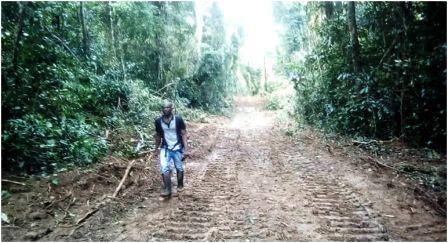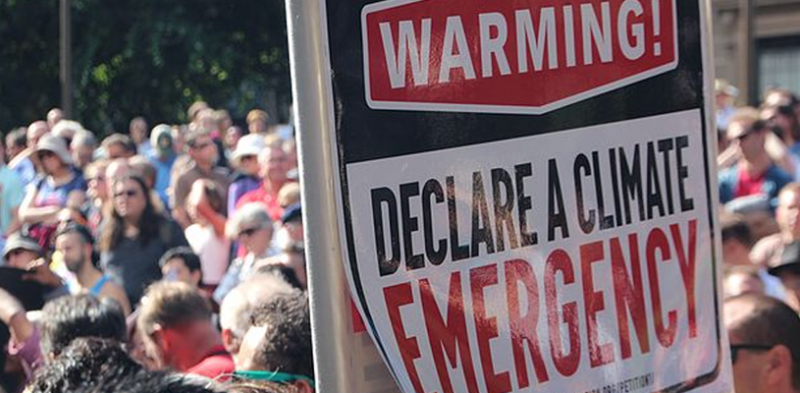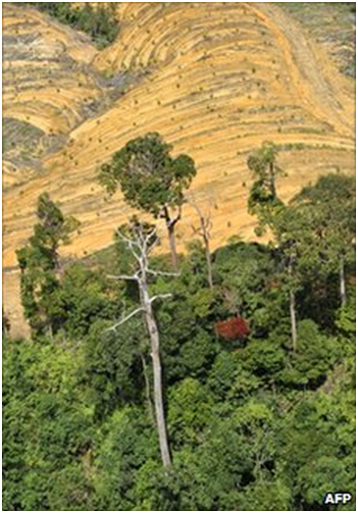Climate talks: storm clouds ahead
When thousands of ministers, scientists and activists descended on the Mexican resort town of Cancún for another gruelling round of talks on climate change last December, there was little of the debate about the science of global warming that marked the chaotic 2009 meeting. The weather had seen to that. From scorching heat and wildfires in Russia to droughts in Australia, floods in Pakistan and snow in the southern US, the evidence of extreme shifts in the world’s climate was impossible to ignore. (Photo: Lilongwe, Malawi. Planting of a tree in at the new Parliament building in Lilongwe, Malawi. Credit: UN Photo/Evan Schneider)
There was plenty of heat inside the conference as well. For African and other poor developing countries, Lesotho Minister of Natural Resources Monyane Moleleki told delegates, progress at Cancún “remains a matter of survival.” Speaking on behalf of the 48 Least Developed countries, Mr. Moleleki noted that they are already experiencing the effects of climate change: “sea level rises” from melting polar ice caps, “enhanced land degradation, declining land-carrying capacity, drought and biodiversity loss, to name a few.” And the poorest countries, he continued, “are the most vulnerable, because they have the least capacity to adapt.”
Surprising success
But by the time the conference ended in the early hours of 11 December, African negotiators and civil society representatives were declaring themselves cautiously encouraged by the progress made. According to the UN Economic Commission for Africa, which played a significant role in supporting Africa’s negotiators in Cancún, the most important achievement was agreement to create a Green Climate Fund to finance climate change adaptation and “green” development in poor countries.
African and other developing countries had long argued for the establishment of such a fund, which is supposed to raise $100 billion annually by 2020 from levies on carbon emissions and air travel, and what the agreement describes as other “predictable and reliable” sources of finance from the industrialized North.
Whether the promised Green Fund will materialize is another matter. As some observers noted, details about its financing were notably lacking, and pledges made at highly visible international conferences are not always met after the television cameras move elsewhere. Ethiopian Prime Minister Meles Zenawi, the chief spokesperson on climate change for the African Union (AU), reminded the leaders of developed countries on the eve of the conference that climate finance “is not aid … it is not assistance…. It is paying the price for their … emissions, for which we in Africa have borne the brunt for too long.”
Tosi Mpanu-Mpanu, the director of the African negotiating team at Cancún, told reporters that after some donors “double-counted” development aid as adaptation finance after the 2009 meeting, “we still have to resolve the issues around transparency on the pledges.”
Forest agreement inked
African delegates nevertheless welcomed an agreement in principle to provide financial incentives for countries to protect their forests, an effort known as Reducing Emissions from Deforestation and Degradation, or REDD. Forests absorb large amounts of climate-changing carbon dioxide from the air and produce oxygen. The carbon is released when forests are cut down, however, making deforestation a major contributor to climate change.
Negotiators even agreed in principle to include developing countries in future emissions reduction agreements. Developing countries had previously resisted calls for mandatory cuts in their emissions, arguing that industrial countries are responsible for the vast majority of pollutants. The onus is on them, the argument went, to reduce their emissions to allow African, Asian and Latin American countries to industrialize, even though some developing countries, including China and India, are large carbon emitters. Finding a formula acceptable to rich and poor countries, however, must await future negotiations.
Durban conference will be key
Agreement on the scope and timing of the key issue of emissions reductions remained elusive at Cancún, however. African countries, which are likely to suffer the most from climate change, have argued for deep cuts to keep disruptions to a minimum. Many industrialized countries have resisted, arguing that large and rapid reductions are too costly and will damage the global economy.
Other analysts argue that for developing countries to be able to grow while keeping overall pollution within safe limits, developed countries will have to make even deeper emissions cuts than they currently foresee. The question of how much to cut — and at what cost and to whom — has been a major impediment to action against climate change for years. Addressing this thorny issue, and thrashing out the details of the Cancún agreements, will form the agenda for the next major meeting in Durban, South Africa, at the end of 2011.
Despite the urgency of the challenge, there is no guarantee of success, particularly with much of the industrialized North still mired in a major economic slump. More can and must be done, insisted UN Secretary-General Ban Ki-moon: “I am deeply concerned that our efforts so far have been insufficient,” he told delegates. “Despite the evidence and many years of negotiations we are still not rising to the occasion…. We need results now, results that curb global … emissions, strengthen our ability to adapt and help to create a more sustainable prosperous future…. The longer we delay, the more we will have to pay — economically, environmentally and in human lives.”
By Michael Fleshman
Stay with Sierra Express Media, for your trusted place in news!
© 2011, https:. All rights reserved.







Meme Mine
/
REAL planet lovers dont’ wish and hope and pray for unstoppable warming to be true.
26th March 2011REAL planet lovers are happy and overjoyed and relieved a crisis was avoided.
The rest of you were fear mongering neocon-like Greenzis who will be cursed in history for this insanity of climate blame.